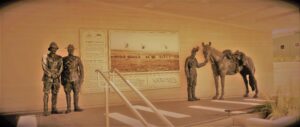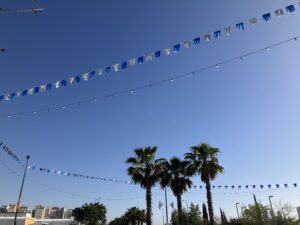“So Achan answered Joshua and said, ‘Truly, I have sinned against the LORD, the God of Israel, and this is what I did: when I saw among the spoil a beautiful [good] mantle from Shinar and two hundred shekels of silver and a bar of gold fifty shekels in weight, then I coveted them and took them; and behold, they are concealed in the earth inside my tent with the silver underneath it'” (Josh 7:20-21).
Although it is not as clear in the translation, the original Hebrew of Achan’s confession has been taken near word for word from the story of the fall in Gen 3:6: “When I saw (“and she saw”) … a good mantle (“the good tree”) … and I coveted (“and it was coveted/desirable”) … and I took (“and she took”)” (Josh 7:21). Not only are these the only two places in the Hebrew Bible where this unique cluster of words are found, but they also appear in both stories in the exact order. And both passages describe the specific path of temptation leading to a fall.
The author of Joshua wants us to connect the dots, not only between the original sin and Achan’s failure, but also between the Garden of Eden and the Promised Land. This parallel strongly suggests that the people of Israel aren’t just entering a random piece of real-estate. Rather, they have come to reconquer the actual Garden of Eden from the clutches of the serpent and his spiritual seed (see Gen 3:14-15; 9:25-27).
Other parallels strengthen this connection between the Land of Canaan and the Garden of Eden. First, the particular verb used for God’s bringing of the people of Israel into the Promised Land (“he gives you rest;” Josh 1:13, 15; see Deut 12:9-10) is the same verb used for God’s bringing Adam into the Garden of Eden (Gen 2:15). The Promised Land is bounded by the same rivers (Josh 1:4; see Gen 15:18) as the Garden of Eden (see Gen 2:14; 15:18). The verb in Joshua used to describe the conquest of Canaan (“to subdue/conquer;” Josh 18:1) is the same verb used for God’s command to Adam to subdue/conquer the land in the creation mandate (Gen 1:28).
This parallel strongly suggests that the people of Israel aren’t just entering a random piece of real-estate. Rather, they have come to reconquer the actual Garden of Eden from the clutches of the serpent and his spiritual seed.
This identification of the land of Canaan as the Garden of Eden makes the story of Achan’s sin all the more tragic. We are not just dealing with an inconsequential failure. Rather, we are reading about another fall in the Garden of Eden. Achan has just planted the seed for yet another exile from Eden. It cannot be a coincidence, therefore, that the “beautiful mantle” Achan took is from Shinar/Babylon (Josh 7:21). This is the same place where Adam’s first descendants were exiled after his fall (Gen 11:2), and it’s where Adam’s future descendants (Israel) will also be exiled (2 Kings 25:8; Dan 1:2).
But why is it important for us to identify the Promised Land as Eden? It’s important for a few reasons. First, it helps us understand that God’s election of Abram and his descendants is a direct response to the fall in Genesis 3. Abram and his children are thereby directly associated with the “seed of the woman” chosen by God to restore creation. Second, it helps us see that God did not bring Abram to just any land (Gen 12:1-3). Rather, he was bringing him and his descendants to reclaim/reconquer the Garden of Eden. Third, Adam’s failure, then Achan’s, set the stage for the choosing of a “New Adam” who must come to defeat the serpent in order to reclaim the land of Eden (Gen 22:17; 24:60; Gen 49:8-12; Num 24:17-19).
The story of redemption simply does not allow us spiritualize away the physical identity of the Promised Land any more than it allows for us to spiritualize away Yeshua’s physical identity as the seed of the woman and as a descendent of Abraham (Matt 1:1; Rom 1:3; 9:5). God’s plan of redemption necessarily involves the return of Yeshua to a very specific place on the map where he will finally crush the head of the serpent. And on that day, God’s blessings will flow out from God’s beloved city to the rest of the world.
“Now it will come about that In the last days the mountain of the house of the LORD will be established as the chief of the mountains, and will be raised above the hills; And all the nations will stream to it. And many peoples will come and say, ‘Come, let us go up to the mountain of the LORD, to the house of the God of Jacob; that He may teach us concerning His ways and that we may walk in His paths. For the law will go forth from Zion and the word of the LORD from Jerusalem. And He will judge between the nations, and will render decisions for many peoples; and they will hammer their swords into plowshares and their spears into pruning hooks. Nation will not lift up sword against nation, and never again will they learn war” (Isa 2:2-4; see Isa 65:25).











